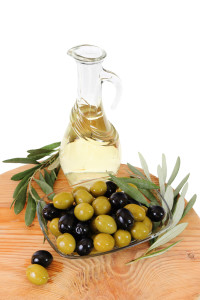Written by Greg Arnold, DC, CSCS. Supplementation with olive leaf significantly improved arterial stiffness and levels of an inflammatory protein called IL-8, which is a predictor of cardiovascular disease.
There is an abundance of research on the health benefits of extra virgin olive oil (1), especially as a core component of the Mediterranean Diet. The antioxidant content of olive oil, namely the high levels of polyphenols (3), phytosterols and lipid-soluble vitamins, as well as the monounsaturated fat in olive oil (3), all combine to create olive oil’s robust health benefits.
But what is less known is the nutritional value of the olive leaf. While olive oil comes from the fruit of the olive plant, the olive leaf contains significantly greater levels of phenol antioxidants per 100 grams of olive leaf (1,450 milligrams) compared to 100 grams of olive fruit (110 milligrams) and 100 milliliters of olive oil (23 milligrams) (4). As a result, olive leaf extract may be an underutilized food for promoting health.
Now a new study (5) suggests olive leaf may be a benefit to blood vessel health. The study involved18 subjects (9 men, 9 women) aged 19 to 40. They were given either a single dose of 1,600 milligrams of olive leave extract (4 400-milligrams capsules) that provided 51 milligrams oleuropein and 10 milligrams hydroxytyrosol or a placebo (900 milligrams of safflower oil) for 1 day. 
Over the course of the day, 24-hour urine samples were obtained and blood samples were collected at 1, 3, and 6 hours after supplementation. Blood vessel health was measured with a digital volume pulse every 30 minutes for 6 hours, resulting in a “stiffness index” (with a higher reading indicating better blood vessel health). The stiffness index has been found to be “positively correlated with cardiovascular risk factors including age, blood pressure, waist:hip ratio and carotid thickness”(6).
Each group then underwent a 4-week “washout” and switched supplement groups for another single-dose trial. To isolate the effect of phenol intake from olive leaf versus the placebo, subjects were instructed to consume a low polyphenol diet (devoid of tea, coffee, fruit, vegetables, alcoholic beverages, cocoa, wholegrain and avoiding all olive-containing products in particular) over the course of the washout period.
The researchers noted a significant benefit to blood vessel health in the olive leaf group compared to the placebo group. Specifically, the olive leave group had a greater stiffness index at 30 minutes (1.25 versus -0.1 meters/second) and at 6 hours (0.35 versus -0.40 m/s) compared to the placebo group (p = 0.0085). In addition, blood samples showed significantly lower levels of an inflammatory protein called IL-8, shown to be a predictor of increased cardiovascular disease risk (7), with blood levels of IL-8 in the olive leaf group to be less than half of the placebo group 6 hours after supplementation (2,100 versus 4,400 milligrams) (p = 0.0326).
For the researchers, “The present study provides the first evidence that olive leaf extract positively modulates vascular function and IL-8 production in humans, adding to growing evidence that olive phenolics could be beneficial for health.”
Source: Lockyer S. Secoiridoids delivered as olive leaf extract induce acute improvements in human vascular function and reduction of an inflammatory cytokine: a randomised, double-blind, placebo-controlled, cross-over trial. Br J Nutr 2015 Jul 14;114(1):75-83. doi: 10.1017/S0007114515001269. Epub 2015 Jun 8
© The Authors 2015
Posted July 18, 2016.
Greg Arnold is a Chiropractic Physician practicing in Hauppauge, NY. You can contact Dr. Arnold directly by emailing him at PitchingDoc@msn.com or visiting his web site at www.PitchingDoc.com.
References:
- Lo´pez-Miranda J, Pe´rez-Jime´nez F, Ros E, et al. (2010) Olive oil and health: summary of the II international conference on olive oil and health consensus report, Jae´n and Co´rdoba (Spain) 2008. Nutr Metab Cardiovasc Dis 20, 284–294
- Yang D-P, Kong D-X & Zhang H-Y (2007) Multiple pharmacological effects of olive oil phenols. Food Chem 104, 1269–1271
- Aguilera CM, Mesa MD, Ramirez-Tortosa MC, et al. (2004) Sunflower oil does not protect against LDL oxidation as virgin olive oil does in patients with peripheral vascular disease. Clin Nutr 23, 673–681
- Owen RW, Mier W, Giacosa A, et al. (2000) Phenolic compounds and squalene in olive oils: the concentration and antioxidant potential of total phenols, simple phenols, secoiridoids, lignansand squalene. Food Chem Toxicol 38, 647–659
- Lockyer S. Secoiridoids delivered as olive leaf extract induce acute improvements in human vascular function and reduction of an inflammatory cytokine: a randomised, double-blind, placebo-controlled, cross-over trial. Br J Nutr 2015 Jul 14;114(1):75-83. doi: 10.1017/S0007114515001269. Epub 2015 Jun 8
- Wykretowicz A, Gerstenberger P, Guzik P, et al. (2009) Arterial stiffness in relation to subclinical atherosclerosis. Eur J Clin Invest 39, 11–16
- Boekholdt SM, Peters RJ, Hack CE, et al. (2004) IL-8 plasma concentrations and the risk of future coronary artery disease in apparently healthy men and women: the EPIC-Norfolk Prospective Population Study. Arterioscler Thromb Vasc Biol 24, 1503–1508.
